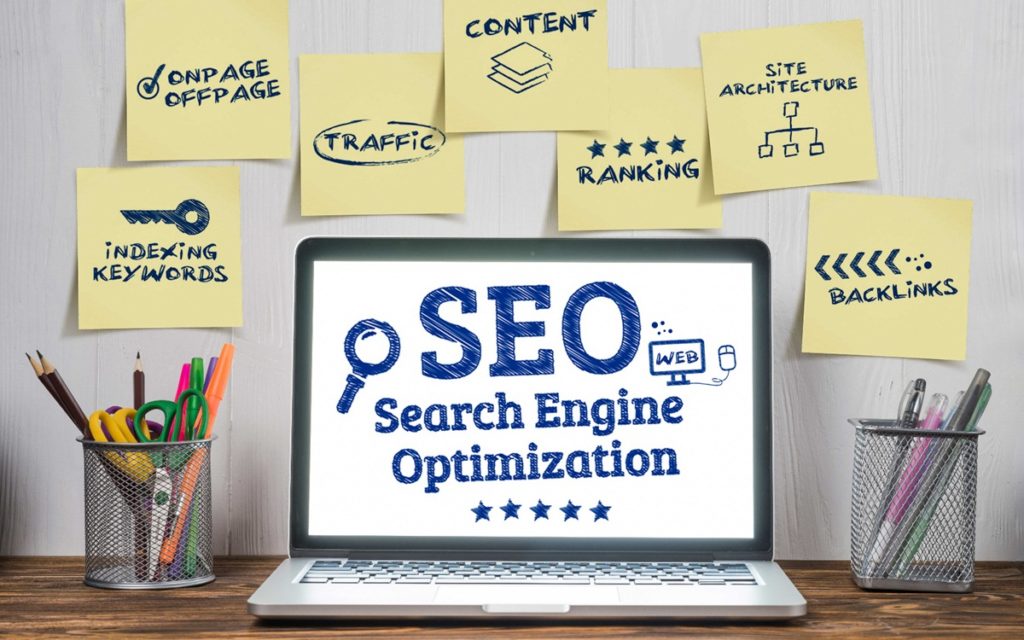In the bustling online marketplace, visibility is key to success, and that’s where Search Engine Optimization (SEO) comes into play. SEO is a strategy used to improve a website’s ranking in search engine results pages (SERPs).
This startup SEO guide aims to take startups through the intricacies of SEO, revealing how it can benefit their business and potential downsides to consider. Plus, we’ll explore setting SEO goals and tracking, as well as an overview of the top tools available, both free and paid. Let’s embark on this journey to unlock the potential of SEO for your startup.
Detailed Explanation of SEO
Search Engine Optimization (SEO) is the practice of optimizing a website to enhance its visibility on search engine results pages (SERPs). When users perform a search on search engines like Google, the engine uses complex algorithms to determine the most relevant and useful content to display. These algorithms consider a variety of factors like the quality and relevance of the content, the number of links pointing to the site, the structure and security of the website, and the user experience among others.
At the heart of SEO are keywords. These are words and phrases that users type into search engines when looking for information. By using these keywords in your content, you increase the chances of your website being among the top results when these words are searched for.
But SEO isn’t limited to keywords alone. It involves several other strategies including creating high-quality, relevant content, enhancing website design and speed, securing your website (HTTPS), building high-quality backlinks (links from other websites pointing to yours), and delivering a seamless and enjoyable user experience. SEO is about providing value to the user, and search engines reward sites that do this with higher rankings.

Why Your Startup Needs SEO
Understanding the role of Search Engine Optimization (SEO) in your startup’s digital strategy can significantly impact your online presence, customer reach, and overall business success.
SEO is a crucial aspect of any digital marketing strategy. It’s an ongoing effort that requires regular updates and tweaks according to algorithm changes, evolving business goals, and customer behavior trends. By making SEO a priority, your startup is investing in its long-term online presence and, consequently, its overall success.
Remember, a well-implemented SEO strategy does more than increase website traffic; it builds brand credibility, enhances user experience, and provides invaluable insights into customer behavior. Here are the reasons why your startup needs SEO.
Increased Visibility and Reach
The digital world is vast and becoming increasingly crowded every day. Millions of businesses compete for attention online, and appearing at the top of Search Engine Results Pages (SERPs) can significantly increase your visibility. A higher ranking in SERPs makes it easier for potential customers to find you when they search for relevant keywords. In other words, with SEO, your startup doesn’t need to reach out to customers; the customers come to you. This passive lead generation is one of the major advantages of an effective SEO strategy.
Building Trust and Credibility
User trust is an invaluable asset for any startup. Websites that rank higher on search engine results are typically considered more trustworthy. This perception arises because search engines like Google prioritize high-quality, relevant, and user-friendly sites. A well-optimized website that provides valuable content helps build your business’s credibility. Consistently appearing in high search rankings also increases brand recognition, reinforcing your startup’s legitimacy in the eyes of potential customers.
Cost-Effective Marketing
While startups may have limited funds for marketing, SEO offers a cost-effective solution with a potentially high return on investment. Unlike traditional advertising or Pay-Per-Click campaigns, SEO is an inbound marketing strategy. Instead of reaching out to consumers (who may or may not be interested in your product), SEO focuses on making it easier for your target audience to find you when they are actively seeking information or solutions you offer.
This approach increases the likelihood of attracting high-quality leads, leading to more conversions. Plus, once your website is well-optimized, you’ll continue to reap the benefits without the same level of ongoing expenditure required by other marketing strategies.
Improved User Experience
SEO isn’t just about search engines—it’s also about users. In fact, the two are interconnected, as search engines favor websites that offer a user-friendly experience. This includes mobile-friendly design, intuitive navigation, high-quality, relevant content, and fast load times.
By enhancing user experience, you are more likely to increase user engagement, lower your bounce rate, and improve your conversion rates. Positive user experiences also promote return visits and are more likely to result in users sharing your content, providing you with free marketing and backlinks that further improve your SEO.
Gaining Valuable Insights About Your Customers
SEO tools, such as Google Analytics, provide valuable insights about your customers. You can find out what keywords customers use when searching for your products or services, their browsing behavior, geographical location, demographics, and even the times they’re most active online. Such insights can inform your overall marketing strategy and help you tailor your offerings to meet your customers’ needs more effectively.
Maintaining a Competitive Edge
Chances are, your competitors are already investing in SEO. To keep up, your startup needs to invest in SEO too. If your website isn’t optimized, you’re effectively giving away business to your competition. Furthermore, SEO can give startups an edge over larger, more established competitors. While they might have larger marketing budgets, a targeted SEO strategy can enable you to compete on more equal footing by appearing in the same search results.

Negatives of SEO for Startups
While SEO offers numerous benefits for startups, it also comes with its set of challenges and potential downsides. Understanding these can help you better manage your SEO strategy and expectations.
Here are some negatives of SEO for startups:
- Time-Consuming: SEO is not an immediate solution; it’s a long-term strategy. It can take several months, even years, to see significant improvements in your website’s ranking and traffic. Developing an SEO strategy, implementing it, and then tweaking it as algorithms change is a time-consuming process that requires continuous attention and effort. For startups that often operate in fast-paced environments and need quicker results, this can be a drawback.
- Algorithm Changes: Search engines regularly update their algorithms to improve user experience. While this is generally a good thing, it can pose a challenge for SEO efforts. A strategy that worked one month might not work the next, and sudden algorithm changes can result in a drop in rankings. Staying up-to-date with these changes and adapting your SEO strategy accordingly requires constant vigilance.
- Requires Expertise: SEO is a complex field that requires specialized knowledge and skills. While there are many resources available to learn SEO, getting to grips with the finer details and keeping up with the constant changes can be a challenge. Hiring an in-house SEO expert or outsourcing SEO services can be expensive for a startup.
- Risk of Penalties: If SEO is not done correctly, it can lead to penalties that can severely affect your website’s ranking. Unethical practices, often referred to as ‘black-hat SEO‘, such as keyword stuffing, using unrelated keywords, or adding invisible text, can lead to your website being demoted or even removed from search results. Recovering from a Google penalty can be a long and complex process.
- High Competition: There’s a lot of competition for the top spots in search engine results, especially for common keywords. As a startup, you might find yourself competing against large, well-established businesses with more extensive resources and larger SEO budgets.
- Difficult to Measure: While there are numerous tools to track SEO progress, attributing results directly to specific SEO efforts can be difficult. For example, a rise in organic traffic could be the result of several factors, not just your SEO strategy. This can make it challenging to determine the exact impact of your SEO efforts and calculate a precise return on investment.
Despite these challenges, SEO remains a crucial part of a successful online strategy for startups. Understanding the potential pitfalls can better equip you to navigate them and implement a successful SEO strategy for your startup.

SEO for Startups: Goals and Tracking
Setting SEO Goals
Your SEO goals should align with your overall business objectives and provide clear, measurable targets. Here are common goals that startups typically focus on:
- Increase Organic Traffic: This is one of the most common SEO goals for startups. Organic traffic refers to visitors that land on your website as a result of unpaid (“organic”) search results. High organic traffic means that your website is considered authoritative and relevant by search engines and users alike. It also usually correlates with improved visibility and higher rankings in search engine results pages (SERPs).
- Improve Keyword Rankings: Ranking higher for relevant keywords not only boosts your visibility but also can bring more qualified traffic—users who are more likely to be interested in your product or service. Start by conducting thorough keyword research to identify keywords that are relevant to your business, have a good search volume, and an achievable level of competition. Remember to focus not only on short, popular keywords but also on long-tail keywords—more specific phrases with lower search volumes but potentially higher conversion rates.
- Enhance User Engagement: Attracting users to your site is only the first step; you also want to keep them there. User engagement metrics include bounce rate (the percentage of visitors who navigate away after viewing only one page), average session duration (how long, on average, users spend on your site), and pages per session (how many pages, on average, users view during a single visit). The better these metrics are, the more engaging your site is considered by both users and search engines.
- Increase Conversions: In the end, what matters most is whether your website encourages visitors to take the action you want them to take. This might be making a purchase, filling out a form, downloading a resource, or signing up for a newsletter. You’ll need to define what counts as a “conversion” in the context of your business, set a target conversion rate, and then optimize your website to encourage as many conversions as possible.
Tracking SEO Goals
After you’ve set your goals, you need a way to track your progress. Here are some key tools and metrics:
- Google Analytics: This is a must-have tool for any startup. It allows you to monitor numerous metrics related to traffic, user behavior, and conversions. For example, you can track the number of users visiting your website, where they’re coming from, which pages they visit, how long they stay, and whether they complete desired actions (conversions). You can even set up custom goals in Google Analytics to track specific actions you want users to take.
- Google Search Console: Google Search Console provides insights into how Google’s search bots see your website. It can show you what keywords your site is currently ranking for, how many impressions and clicks your site is getting for those keywords, and the average position of your site in the search results. It also alerts you to any issues or errors on your site that could affect your SEO performance.
- Rank Tracking Tools: Tools such as SEMrush, Moz, Ahrefs, and SERPWatcher can help you monitor your rankings for specific keywords over time. They provide valuable data about your SEO performance and competitive landscape, allowing you to identify trends, opportunities, and areas for improvement.
- Conversion Rate: This is the percentage of your website visitors who complete a desired action. It’s a crucial metric for measuring the effectiveness of your website and SEO strategy. Google Analytics allows you to track conversions and calculate conversion rates.
- Backlink Analyzers: Backlinks—links from other websites to yours—play a crucial role in SEO. Tools like Moz’s Link Explorer, Ahrefs’ Backlink Checker, or Majestic’s Link Intelligence tools can provide insights into your backlink profile. They allow you to see who is linking to you, what pages they’re linking to, and the quality of those links.
Remember that SEO is a marathon, not a sprint. It might take a while to see the fruits of your efforts. However, consistently tracking your performance using the right tools and metrics will allow you to fine-tune your strategy and maximize your SEO success.

SEO Tools for Startups
There are numerous SEO tools available that can assist startups in improving their visibility and rankings on search engines. Here’s a comprehensive list of both free and paid tools, along with a brief introduction to each:
Free Tools
- Google Analytics: This tool provides insights into your website’s traffic, user behavior, and performance. You can track various metrics, such as page views, bounce rate, session duration, and more. It’s invaluable for understanding your audience and measuring the effectiveness of your SEO efforts.
- Google Search Console: Google Search Console helps you monitor your website’s presence in Google Search results. It alerts you to any issues that could affect your rankings and provides insights into how Google’s bots see your site.
- Moz Free SEO Tools: Moz offers several free tools that can help with your SEO efforts. These include the Keyword Explorer for keyword research, the Link Explorer for monitoring your backlink profile, and MozBar, a free browser extension that provides instant metrics about any webpage you visit.
- Ubersuggest: This tool, developed by Neil Patel, is useful for keyword research, providing keyword suggestions, search volume, and competition levels. The free version offers limited daily searches.
- Yoast SEO: If you’re using WordPress, Yoast SEO is a must-have plugin. It helps with on-page SEO, generating XML sitemaps, and more. The basic version is free and covers many crucial SEO aspects. Complete SEO guidelines for WordPress you can find here – https://netrocket.pro/seo-for-a-wordpress.
Paid Tools
- SEMrush: SEMrush is a comprehensive SEO tool that offers features such as keyword research, backlink analysis, rank tracking, and site audits. It also provides insights into your competitors’ strategies.
- Ahrefs: Ahrefs is known for its sophisticated backlink analysis tools. It also offers a site explorer, keyword research, content explorer, and rank tracker. While Ahrefs doesn’t have a free version, it does offer a 7-day trial for $7.
- Moz Pro: The paid version of Moz provides more advanced features, including a full suite of SEO tools such as rank tracking, site crawling, on-page optimization, and a more detailed keyword research tool.
- Screaming Frog SEO Spider: This tool crawls websites to detect SEO issues such as broken links, duplicate content, and missing metadata. While there is a free version with limited functionality, the paid version offers advanced features.
- KWFinder: Part of the Mangools suite, KWFinder is a powerful tool for keyword research. It provides long-tail keywords with lower SEO difficulty, accurate search volumes, and keyword suggestions.
- Clearscope: Clearscope, powered by AI, is designed to help content teams drive more organic traffic. It provides keyword suggestions to optimize content and increase its relevance to target audiences.
Investing in the right SEO tools can make your SEO efforts more efficient and effective. While the free tools can cover many of the basic SEO tasks, the paid tools usually offer more advanced features and capabilities that can give you an edge, especially in competitive niches. Make sure to choose the tools that best fit your needs, goals, and budget.
Conclusion
SEO can play a pivotal role in your startup’s online success. By improving your website’s visibility in search engine results, you can reach a larger audience, build credibility and trust, and drive more organic traffic to your site. While SEO does come with its challenges, understanding these complexities and strategically navigating them can yield substantial benefits for your startup.
As you venture into SEO, remember that it’s not just about ranking high on search engine results pages; it’s about delivering value to your audience. Utilize the SEO tools at your disposal, monitor your progress, and continually optimize your strategies to meet your goals. With patience and persistence, the results from SEO can be transformative for your startup.
